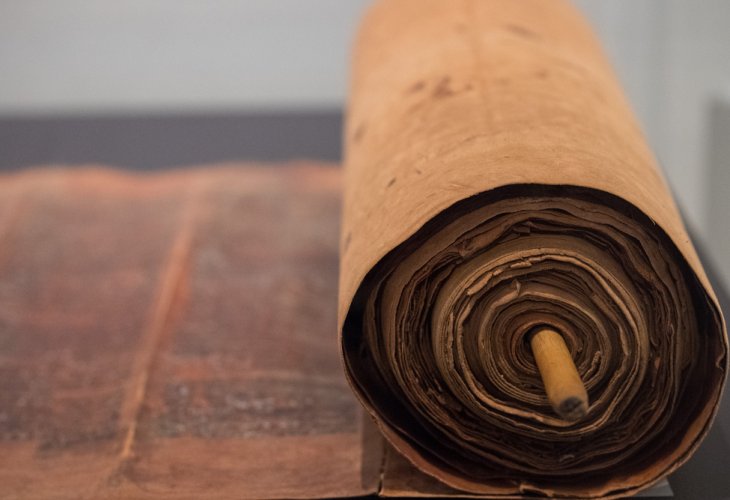Rectifications for the Days of Shovavim
Key to Life's Luck: Health, Marriage, and Sustenance Depend on It
- ראובן אליהו וינטרויב
- פורסם כ' חשון התשע"ד
 (Photo: shutterstock)
(Photo: shutterstock) #VALUE!
In the book "Taharat HaAyin," it's brought in the name of the Rokeach that the initials of luck are "In wasting seed," meaning that a person's luck and abundance in life are directly dependent on guarding the covenant.
Hasidism explains that all elevations and declines in all matters depend solely on this, hence this trait is called "foundation," as it's the foundation of a person (Netivot Shalom I,7.
"The breach of the covenant" is the most serious of all sins (Shulchan Aruch, Even HaEzer 23,1), as if spilling blood, practicing idolatry, and is punishable by death (Tractate Niddah 13b), potentially losing one's share in the World to Come (Reshit Chochmah Chapter 17, p. 500), causing issues in the nervous system and psyche (Adon HaMiddot p. 19), and also delaying redemption, which depends among other things on correcting this breach (Binyan Yosef p. 15).
The main days for rectifying the breach are during the Days of Shovavim, the counting of the Omer, the three weeks, the festival of Sukkot, the festival of Chanukah, and the Ten Days of Repentance.
So how do you stop and break free?
You stop by deciding to stop (Taharat HaBrit p. 14). In Parashat Bereshit 4, it is said to Cain, "And towards you is its desire, and you will rule over it," which Rashi interprets there - if you wish, you will overcome it. It mainly depends on guarding the eyes, the eye sees and the heart covets, and from this falls into sin.
5 Important Rectifications:
Immersing in the mikveh, at least on the eves of Shabbat and festivals (Taharat HaKodesh, Essay of the Rectification of the Foundation, Chapter 1).
Crying and tears out of repentance for the sin (according to Tevuot Shor, Tractate Shabbat 105b), and wiping the tears on the forehead (according to the Ari).
Performing at least once a year a redemption of 84 fasts with rectification of the foundation (Book of Taharat HaKodesh, p. 148).
Reciting the Ari's Shema at night (Taharat HaKodesh, p. 153).
Saying the prayer for correcting nocturnal emissions during the blowing of the shofar (as found in prayer books, Book of Taharat HaKodesh, p. 152).
Rectifications for Weekdays:
Giving charity to the poor (Yesod Ma'aravi p. 82) and for aiding a bride (Book of Shema Yisrael p. 47). Reciting Rectification 48 from the Zohar "Bereshit Taman" (Segulot and Prayers p. 77). Saying the general rectification of Breslev (Yesod Ma'aravi p. 151). Studying from the book of "Hok LeIsrael" (Shearit Yisrael, Gate of the Shovavim, Discourse 1). Not eating one day a week (preferably Thursday) flesh from an animal (meat or fish, Yesod VeShoresh HaAvoda Gate 12). Reciting Psalm 51 (Siftei Tzadik Tu B'Shevat p. 47). Learning for 3 consecutive hours, preferably studying Mishnaic orders of purity (The Slonim Rebbe, Collection of Talks for the First Shomrim p. 76). Learning laws of lashon hara and Shabbat (Netivot Shalom Shovavim p. 36, Yismach Moshe, Good Behavior). Accepting a fast of speech (Yesod Ma'aravi p. 145). Being one of the first ten in the synagogue (Yesod Yosef 13b). Rectifying the trait of pride (Yesod Yosef 10). Reading Parashat Noach (Book of Segulot Yisrael, p. 114). Working the land of Israel (Taharat HaBrit p. 121). Recite Grace After Meals with intention (Shema Yisrael p. 47). Judging others favorably (Shema Yisrael p. 48). Reciting "Perek Shirah" (Shema Yisrael p. 48). Renewing Torah insights (Shema Yisrael p. 48) Eating crumbs of the HaMotzi (Shema Yisrael p. 46b). Reciting the verse "Or Zarua LaTzadik, Ul'Yishrei Lev Simcha" (Shema Yisrael p. 47). Bringing others to repentance (Reshit Chochmah Chapter 10 p. 605). Performing acts of kindness (Akh Nafshenu p. 270). Not rubbing the lower body (Berit Yisrael p. 66). Being careful with the commandment of tzitzit (Imrei Tov, Parashat Shelach, p. 44). During prayer words like "never in vain," to touch the tefillin (Shema Yisrael p. 48a).
Rectifications for Shabbat:
Purchasing food in honor of Shabbat (Yesod Yosef 5,2).
Fasting on Friday until the Shabbat meal (Magen Avraham of Trisk, Exodus p. 2).
Giving charity on Friday (Taharat HaKodesh, p. 164,2).
Clapping hands during "Lecha Dodi" (Tehilot Chaim, p. 296).
Staying awake the entire Friday night to engage in Torah study and in the morning reading all of Psalms before the morning prayer (Shema Yisrael 48b).
Being meticulous about the Fourth Meal (Melaveh Malka) (Shema Yisrael p. 48), and reciting after Shabbat the song "Ish Chassid Haya" (Seferan Shel Tzaddikim p. 18)
Rectifications for Festivals:
Sleeping in the Sukkah (Shema Yisrael p. 48).
Lighting Chanukah candles with oil (Imrei Noam for Chanukah 52b).
Saying the prayer for the correction of nocturnal emissions in the repetition of the Musaf prayer of Yom Kippur (as brought in the Mahzor Rabba p. 337).
On Parashat Metzora, to be called for the seventh aliyah (Shema Yisrael p. 48).
On the eve of the new month, accepting a fast (even half a day, Shema Yisrael p. 47b).

